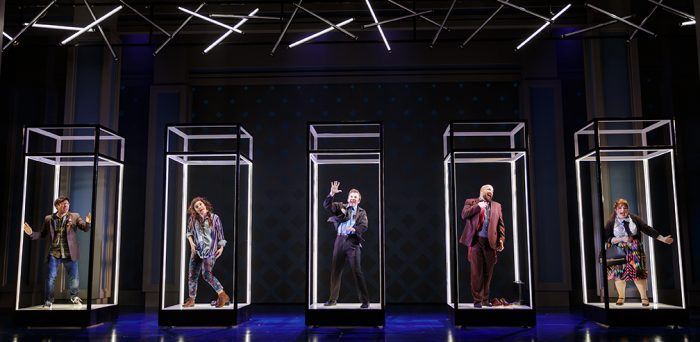Review: “String” Book by Sarah Hammond. Music and Lyrics by Adam Gwon. Produced by Village Theatre. Directed by Brandon Ivie. Music Directed by Michael Nutting. Music Supervised by R.J. Tancioco. Orchestrations by Matt Castle and Frank Galgano. Choreography by Trina Mills. Scenic Design by Timothy Mackabee. Lighting Design by Robert J. Aguilar. Costume Design by Harmony Arnold. With Jessica Skerritt, Lauren Du Pree, Sara Porkalob, Eric Ankrim, Nathaniel Tenenbaum, Bobbi Kotula, Michael Feldman, Danny Kam, Cassi Q Kohl, and Sarah Bordenet. Now through April 22, 2018 at Village’s Gaudette Theater in Issaquah before moving to Everett Performing Arts Center for another run April 27 through May 20, 2018.
Where Maiden Voyage retained the original setting, String — a new musical that opened last week (3/15) at the Village Theatre in Issaquah — flung its characters well into the future. String’s main characters, the Fates, came down out of the sky and took up residence in a skyscraper with dull office jobs, security cameras, and cafeteria vending machine garbage.
In the program’s Authors’ Note, book and music writers Sarah Hammond and Adam Gwon, respectively, described the piece’s origin and inspirations:
The first spark of String came from a book of Greek myths, a picture of the Fates, and a question: why did those sisters never get a story of their own? In the myths, the Fates pop up in other gods’ stories to keep them in check; each Fate has a particular job associated with the string of life — one spins, one measures, and one cuts. It seemed so immediately theatrical, this tangible metaphor for life, a strand of thread passed from sister to sister. Then we had another question: what if the Fates, like the rest of us, sometimes hate their dayjobs?
Even with its premise and aims made plain, String is a hard show to pin down. It is at times a goofy piece, largely because a few of its characters — especially the youngest Fate (Clotho), played by Sara Porkalob — are funny and goofy. It is also a sad piece, as the eldest Fate (Atropos, played by Jessica Skerritt) is supposed to end the life of the man she just fell for (Mickey, played by Eric Ankrim). Accordingly, throughout is a sense of foreboding that comes back strong in Act II.
String was developed at the Village through its Beta Series and had a stripped-down, workshop run at the Village’s smaller First Stage theatre (a mere block away from the main stage) last June. From the workshop version to the main stage (both directed by Brandon Ivie), the production is night and day, and the staging and design were significant in making the play’s world. Lighting was used creatively to indicate night skies and elevators; quick costume changes transformed ensemble characters into numerous roles; special effects demonstrated how out-of-whack the world had become when the Fates had not completed their roles as required.
The ensemble members — who played an impressive variety of minor characters — were key to the show as they lightened up the piece at several points. And while it was a joy to see the talented Lauren Du Pree and Nathaniel Tenenbaum return to the Village after last year’s Village hit Dreamgirls, their characters (Lachesis, the middle Fate; and O’Brien, Mickey’s fellow security guard) were underused, feeling at times gratuitous and doing little to move the story along. Lachesis, in particular, felt hollow in character development and personality when compared to her two sister Fates, who received much bigger roles. The second act also dragged a bit, with a couple of the songs doing little for the whole.

Sara Porkalob (Clotho), Lauren Du Pree (Lachesis), and Jessica Skerritt (Atropos). String Production photo. © 2018 Mark Kitaoka. Property of Village Theatre.
But String also has a bigger problem to contend with. For all the potential of a female playwright reinterpreting mythology in order to focus on the stories of women in a male-dominated context, it is hardly a feminist script. Virtually all we see of the Fates is what happens when one of them (Atropos) falls for a guy — and not even an especially noble guy, but one who spies on Atropos, steals from her, tricks her, and follows her in order to keep meeting; snags a non-consensual kiss after she expresses disinterest; then takes advantage of the sacrifices she makes for him. It may be billed as “a story of their own,” but that story is one of the guy we know little about, gets girl who’s probably overqualified for the job, because the story never bothered to let her meet anyone else. Although it is nice to have the tale centered around women, thematically at least this one strains to pass the Bechdel Test. Where Maiden Voyage showcased the power of the woman at its center, String for the most part left the man to pull their strings.
The result in String is a not particularly empowering play, but an overall inventive plot nonetheless, with solid vocals and a vivid production. All in all, String makes for a good night out, as well as complex feelings afterward — Was that a happy show or a sad one? Was Atropos — or any of the Fates — allowed any free will? Is the whole thing just too hetero-normative for its own good? A post-show drink with friends is wise.
String plays at Village’s Gaudette Theater in Issaquah through April 22, before moving to Village’s Everett location for another run April 27 through May 20. Good to know: Sara Porkalob will not perform in the March 21-25 shows, as she takes her local hit Dragon Lady on the road, to the American Repertory Theater’s Oberon stage in Boston. We therefore recommend choosing another date, as one of the greatest pleasures of String is, ironically, watching Porkalob use, in a wholly different setting, the childlike personalities she perfected in Dragon Lady.





















Dear Mr. Barron,
Thanks for your thoughtful review of Village Theatre’s “String.” However, I do have one area of disagreement. Instead of advising people to avoid the show when another actor is playing the part of your particular favorite (and I DO agree that Ms Porkalob is a tremendous talent), why not encourage folks to see the show twice (the second time is half price) and discover the deep bench of talent that so typifies Village. Sarah Bordenet was a delight in the role and was rewarded audibly by the audience.
Understudies, who also have roles in the ensemble, work doubly hard to learn two or more parts. Then they may have only a matter of a few hours before the have to switch gears.
Just keeping it real. Sarah is my daughter.
Hi Sue,
Thanks for the great suggestion. Sarah was a joy to watch in her multi-faceted ensemble roles as well.
-RB